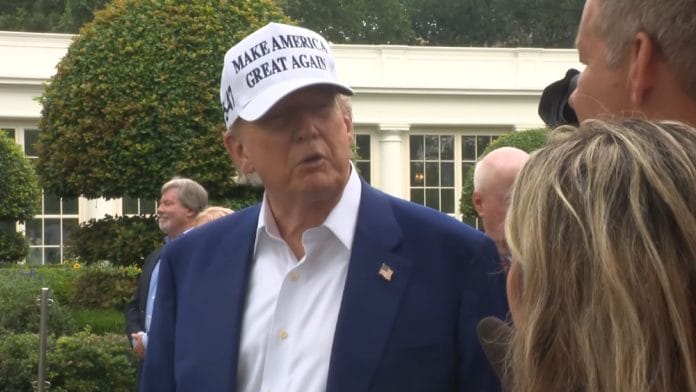New Delhi: In a series of remarks made ahead of a scheduled meeting with Pakistan’s Chief of Army Staff Field Marshal Asim Munir, US President Donald Trump reiterated his claim that he intervened to halt military escalation between India and Pakistan in the aftermath of Operation Sindoor.
Quoting White House Deputy Press Secretary Anna Kelly, Reuters reported that Trump hosted the Pakistan Army chief in Washington after he called for the US president to be nominated for the Nobel Peace Prize for preventing a nuclear war between India and Pakistan.
Speaking to reporters during the installation of a new flagpole on the South Lawn of the White House, Trump said Wednesday that Munir “was extremely influential” in de-escalating from the Pakistan side.
Asked about his upcoming private lunch with Munir, Trump credited both Indian Prime Minister Narendra Modi and Munir for helping defuse the situation. “I stopped the war between Pakistan and India,” Trump said. “This man,” he added, alluding to Munir, “was extremely influential in stopping it from the Pakistan side. Modi from the India side, and others. And they were going at it; they’re both nuclear countries. I got it stopped.”
Trump also expressed his admiration for both countries, saying, “I love Pakistan. I think Modi is a fantastic man. I spoke to him last night. We’re going to make a trade deal with Modi of India.”
Trump has repeatedly taken credit for what he describes as his role in preventing a large-scale conflict between the two nuclear neighbours.
He lamented the lack of media recognition for his claimed intervention. “I don’t think I had one story written about it,” he said. “But that’s okay. The people know.”
Indian officials, however, have consistently rejected Trump’s assertions of US mediation.
Foreign Secretary Vikram Misri has stated that any decision to cease military operations was taken independently and through direct communication channels between the Indian and Pakistani militaries.
Modi conveyed to Trump Tuesday that India has never accepted mediation in its bilateral matters, does not accept it now, and will not do so in the future, according to a media briefing by Misri, adding that Modi emphasized there is complete political consensus within India on this position.
The two leaders spoke for 35 minutes over the phone after a planned meeting on the sidelines of the G7 summit was canceled due to Trump’s early return to the US amid the escalating Israel-Iran conflict, Misri added.
Trump however, has continued to link his claimed diplomatic intervention to broader successes in conflict resolution.
“Iran and Israel should make a deal, and will make a deal—just like I got India and Pakistan to make,” he said Sunday, once again asserting that US trade leverage was instrumental in bringing both sides to the table.
Meanwhile, Munir’s meeting with Trump, though unofficial, has drawn attention given the current sensitivities in US-Pakistan relations and the ongoing regional volatility in South Asia.
Trump reportedly invited Munir to discuss regional security issues, with a particular focus on the escalating Israel-Iran conflict and efforts to bolster US-Pakistan military cooperation. The agenda may also include counterterrorism efforts and the recent flare-up in India-Pakistan tensions.
However, the specific objectives of the closed-door lunch remain unclear, fueling speculation.
According to Dawn, on whether the talks included the current Iran-Israel conflict, Trump said: “They (Pakistan) know Iran very well, better than most, and they’re not happy about anything. It’s not that they’re bad with Israel. They know them both, actually, but they know Iran better.
“He (Field Marshal Munir) agreed with me. The reason I had him here was that I wanted to thank him for not going into the war [with India]. And I want to thank PM [Narendra] Modi as well, who just left a few days ago. We’re working on a trade deal with India and Pakistan. These two very smart people decided not to keep going with a war that could have been a nuclear war.”
Pakistan People’s Party chief Bilawal Bhutto in a post on X Wednesday, labelled the meeting between the two “a positive step in Pakistan US relations” adding, “Especially given the president’s role in mediating a ceasefire.”
This is an updated version of the report
(Edited by Amrtansh Arora)
Also Read: Asim Munir features on Times Square billboard. Pakistanis ask, ‘Who paid for it?’






